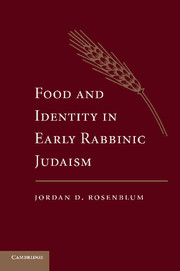Conclusion
Published online by Cambridge University Press: 06 July 2010
Summary
BASSANIO
If it please you to dine with us –
SHYLOCK
Yes, to smell pork, to eat of the habitation which your prophet the Nazarite conjured the devil into. I will buy with you, sell with you, talk with you, walk with you, and so following; but I will not eat with you, drink with you, nor pray with you.
With whom you eat is a powerful statement about your identity, whether you live in 210 c.e. or 2010 c.e. Breaking bread is a social language that operates under the assumption that commensality is a practice that results in social digestion – breaking groups into smaller social units. This presumption is tacit in English vernacular, as the Latin derivation of the word “companion” literally means “one with whom one shares bread.” When Shylock declines Bassanio's dinner invitation, his refusal to participate in commensality with Gentiles contains two assumptions that we have encountered throughout this book: (1) commensality leads to social intimacy and identity; and (2) pork is a metonymic food of the “culinary Other.”
Throughout, I have argued that the Tannaim innovate and manipulate food practices to construct a distinctly Jewish, male, and rabbinic identity. As I argue in Chapter 1, however, what the Tannaim ate, and how they obtained, prepared, and consumed their food, does not differ on the macro level (i.e., in general structure and appearance) from that of their ancient Mediterranean contemporaries. Where it does differ is on the micro level.
- Type
- Chapter
- Information
- Food and Identity in Early Rabbinic Judaism , pp. 185 - 192Publisher: Cambridge University PressPrint publication year: 2010



